
(HBO) – The northern mountainous province of Hoa Binh has determined digital transformation as an indispensable requirement for sustainable development, and issued a series of resolutions and decisions on digital transformation for the 2022-2025 period with vision to 2030.

Officials
in Tan Lac district apply information technology to improve work efficiency
In 2022, the provincial People's Committee and the provincial
Digital Transformation Steering Committee issued documents directing the
implementation of digital economy and digital society in the province.
Accordingly, the document management and administration system
has been deployed to all state administrative agencies at all three levels of
province, district and commune. State agencies processed electronic documents
online through document management and administration system with digital
signature.
The province's online video conferencing system operates
efficiently, ensuring communication, sound quality, clear images, and
organising meetings in a timely fashion to help save time and costs.
Over the past time, along with the shift of e-government,
digital economy has also been promoted and deployed in all economic fields with
a highlight of agricultural and rural digital economy which has developed
sustainably on the e-commerce platforms such as Portmart.vn and Voso.vn.
The development of digital economy has gradually changed the
perception and traditional ways of doing business of people and households
about selling products on the digital space, e-commerce platforms, expanding
product consumption to foreign markets.
In
order to effectively implement the province’s digital transformation plan in
2023, the provincial People’s Committee has proposed five key solutions, namely
promoting communication and raising awareness and digital skills; enhancing
interaction with people and businesses;researching and cooperating to
master and effectively apply technologies; attracting information technology
resources; and strengthening international cooperation.
The Standing Board of the Hoa Binh provincial Party Committee has agreed in principle on a proposal by the Standing Board of the Party Committee of Hoa Binh city to gather feedback on the city’s 1:2000 zoning plan, which forms part of its broader urban development strategy.
Hoa Binh province has made notable progress in public administration reform and digital government development, with the satisfaction index among citizens and businesses reaching over 84%, according to recent government evaluations.
Thanks to great efforts by local authorities in recent times, the governance and public administration performance of Mai Chau district has been significantly improved.
In the afternoon of June 6, the Party Committee, the People's Council, the People's Committee and the Fatherland Front of Lac Son district solemnly held a meeting to celebrate the 139th anniversary of the district's founding (1886–2025) and the 79th anniversary of the establishment of the district's Party Committee (1946–2025). There was the attendance of Mr. Bui Van Thang, the Vice Chairman of the Provincial People's Council; Mr. Quach Tat Liem, the Vice Chairman of the Provincial People's Committee; Ms. Dang Bich Ngoc, the Deputy Head of the National Assembly Delegation of the province; as well as the former leaders of the province and district through various periods, who are the natives of the district.
Implementing the Politburo’s Resolution No. 57-NQ/TW on breakthroughs in science – technology, innovation, and digital transformation is a golden opportunity for the northern mountainous province of Hoa Binh to renew growth model, improve competitive edge and shorten digital gap.
Resolution 57-NQ/TW, issued by the Politburo on December 22, 2024, identifies sci-tech, innovation, and digital transformation as strategic breakthroughs to build a developed and prosperous nation. In Hoa Binh province, this spirit is not just a slogan, it’s being put into action through concrete initiatives that form a "new development triangle”: digital citizenship, digital economy, and digital administration.



